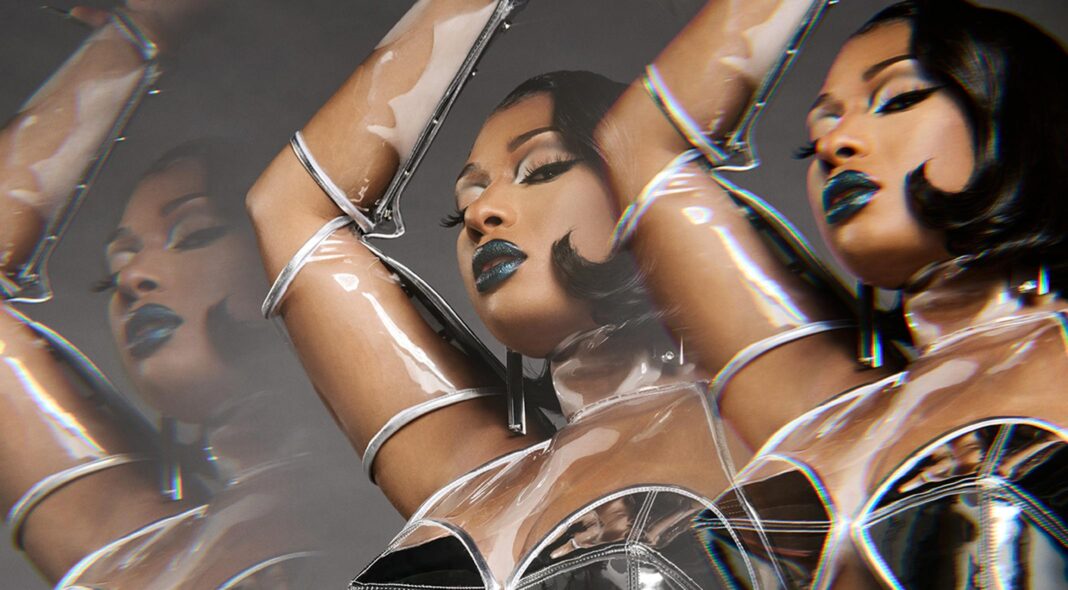If her 2019 rise to prominence was a Hot Girl Summer, the last two years of Megan Thee Stallion’s life has been an unapologetic hustle. Capitalising on her stardom with real grit and resilience, the 27-year-old has racked up three Grammy awards, an array of Billboard hits, a college degree, a Netflix deal and the launch of a non-profit charitable organisation in honour of her parents. With every swish of her 40-inch weave, she has worked to convince us all that we can be hotties alongside her, capable of advocating for ourselves in both boardroom and bedroom.
Under this impressive veneer, however, her life has also been marred with the kind of trauma that gives her second album its name. In the same timespan of all her successes, she has lost her mother, been a survivor of gun violence, and then had her name dragged through the mud for daring to speak up about it. Subject to cruel colourism and victim shaming, her tall, statuesque Blackness and confident demeanour has often been deemed unworthy of the kind of empathy that might be afforded to white women. She has had to go to battle with her record label, and seemingly with herself, dealing with emotions that one might not want to admit to themselves in their quest to be an infallibly great rap icon.
While debut album ‘Good News’ kept its chin up and focused on exactly that, ‘Traumazine’ shows a woman who has found the strength to open up a little more. From the refrain of ‘Ungrateful’ alone, it is clear that Meg is totally, completely done with anyone who falls into the category of “fake-ass, snake-ass, backstabbing, hatin’-ass, no money, kidding-ass bitches”, and will be taking no further prisoners. Whether they are people who have wronged her personally or entire societal structures ( “My motherfucking body/ My choice,” she raps on ‘Gift & A Curse’, linking back to her Roe vs Wade statement), she is not so much hot but in full flame, ready to tear down anyone who has served to keep her down.
Though the circumstances of her rage and despair are not to be wished upon anyone, the vocal aggression really suits her flow. Full of the kind of outrageous southern smack-talk that would slay any rap battle, ‘Not Nice’ is easily one her finest songs to date, channelling the spirit of a Queen Latifah or Lil Kim as she bitterly recounts the way she has been made to feel at the hands of a sexist world media; “I guess my skin ain’t light enough, my dialect not white enough, or maybe I’m just not shaped the way to make these niggas give a fuck”. Tinged with political observationalism, it’s a move that’s rare for her, but one that manages to diss her abuser without allowing him to become the star of the show.
Even when her ire cools, Stallion’s message remains vital. A good half of ‘Traumazine’ rings with frustration, but it blends neatly with the kind of confident brag rap we all know and love, the sort that can convince any listener that they are indeed the greatest bitch the world has ever seen. A pronoun-boasting ballroom vogue that would likely meet the ‘Renaissance‘-approval of hometown hero Beyoncé, ‘Her’ demonstrates her versatility on a dance beat, nodding to the tips she likely picked up as a judge on HBO’s competition show Legendary.
Songs like ‘Red Wine’ and ‘Ms. Nasty’ feels like natural successors to ‘WAP’ with their comedic moans and metaphors (“got a running start…put your javelin in it”), while ‘Scary’ makes great use of guest star Rico Nasty to don an emo-Halloween-ish trap cloak, bragging about being a “thick-thighed nightmare.” ‘Consistency’, featuring the slippery R&B vocals of Jhené Aiko, makes smooth use of The Isley Brothers ‘Between The Sheets’ (popularised by Biggie’s ‘Big Poppa’), demanding that her lover settle down to become a one-woman man. It’s not a request so much as an insistence; Stallion has had it up to here with not being treated in the way she deserves, and that extends to all facets of her life.
It is difficult to pull off a perils-of-fame record without descending into cliché, but across ‘Traumazine’, a big theme is the cost of betrayal, putting your faith in people who turn out to be one big vicious disappointment. Signed to both 300 Entertainment and 1501 Certified Entertainment, Stallion is currently embroiled in a high-profile and messy legal battle with the latter, who she claims have directly interfered with her ability to release new music, insisting that 2021’s ‘Something For The Hotties’ did not fulfil her contract. She doesn’t appear to address this specifically in lyrics, but the way she sings on ‘Flip Flop’ comes close, speaking of the loneliness she feels without her parents to help guide her through an industry that is often only out for what it can get.
On ‘Anxiety’, she gets even deeper over a loose, almost playground-ish beat, namechecking Britney and Whitney as she explores the way in which women are left bereft in the industry to work out their own issues: “They keep saying I should get help but I don’t even know what I need/ They keep saying “speak your truth”/ And at the same time saying they don’t believe… All I really wanna hear is, ‘It’ll be OK’ / Bounce back ’cause a bad bitch can have bad days”. It ties us all the way back to Megan’s desire to be recognised as human; a sexy, glamorous, resilient boss of a human, but still a sensitive soul underneath it all, one who is willing to share, not only for her own healing but for that of her fans.
‘Traumazine’ may not be perfect, but it comes pretty close. Some of the beats still feel a little samey, the pussy metaphors only so creatively infinite. Yet again, there is use of the same ableist slur that Beyoncé and Lizzo have both been called out for. But as Stallion well knows, the standards she is up against are often double. When was the last time Kanye West was called out for his same frequent use of the word? How often is a man critiqued for rapping endlessly about his sexual prowess? By bringing such versatility to her discography, Megan Thee Stallion writes herself into an even more vivid being, proving that you can be yourself and address a situation head-on without letting adversity define you. We know her a little better now, but she remains entirely in control of her narrative. By exploring her vulnerabilities and fulfilling her contract, this bad bitch just got even more powerful. Who knows what else this exploratory era might bring?
READ MORE: Megan Thee Stallion finally has justice but we must learn from how she was treated







